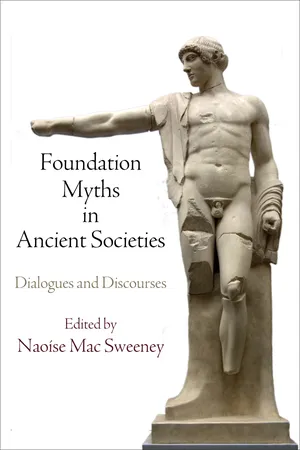
Foundation Myths in Ancient Societies
Dialogues and Discourses
- 256 pages
- English
- PDF
- Available on iOS & Android
Foundation Myths in Ancient Societies
Dialogues and Discourses
About This Book
Throughout the ancient world, origin stories were told across the ancient world in many different ways: through poetry, prose, monumental and decorative arts, and performance in civic and religious rituals. Foundation myths, particularly those about the beginnings of cities and societies, played an important role in the dynamics of identity construction and in the negotiation of diplomatic relationships between communities. Yet many ancient communities had not one but several foundation myths, offering alternative visions and interpretations of their collective origins.Seeking to explain this plurality, Foundation Myths in Ancient Societies explores origin stories from a range of classical and ancient societies, covering both a broad chronological span (from Greek colonies to the high Roman empire) and a wide geographical area (from the central Mediterranean to central Asia). Contributors explore the reasons several different, sometimes contradictory myths might coexist or even coevolve. Collectively, the chapters suggest that the ambiguity and dissonance of multiple foundation myths can sometimes be more meaningful than a single coherent origin narrative. Foundation Myths in Ancient Societies argues for a both/and approach to foundation myths, laying a framework for understanding them in dialogue with each other and within a wider mythic context, as part of a wider discourse of origins. Contributors: Lieve Donnellan, Alfred Hirt, Naoíse Mac Sweeney, Rachel Mairs, Irad Malkin, Daniel Ogden, Robin Osborne, Michael Squire, Susanne Turner.
Frequently asked questions
Information
Table of contents
- Cover
- Title
- Copyright
- Contents
- List of Abbreviations
- Introduction
- Chapter 1. Foreign Founders: Greeks and Hebrews
- Chapter 2. Oikist and Archegetes in Context: Representing the Foundation of Sicilian Naxos
- Chapter 3. Who’s the Daddy? Contesting and Constructing Theseus’ Paternity in Fifth-Century Athens
- Chapter 4. The Founder’s Shrine and the Foundation of Ai Khanoum
- Chapter 5. Alexander, Agathos Daimon, and Ptolemy: The Alexandrian Foundation Myth in Dialogue
- Chapter 6. Figuring Rome’s Foundation on the Iliac Tablets
- Chapter 7. Beyond Greece and Rome: Foundation Myths on Tyrian Coinage in the Third Century AD
- Epilogue
- List of Contributors
- Index
- Acknowledgments